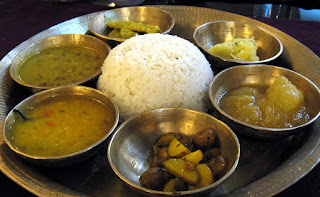Assamese Thali
Assamese cuisine is a mixture of different indigenous styles, with considerable regional variation and some external influences. Although it is known for its limited use of spices, Assamese cuisine has strong flavors from its use of endemic herbs, fruits, and vegetables served fresh, dried, or fermented. Rice is the staple food item and a huge variety of endemic rice varieties, including several varieties of sticky rice, are a part of the cuisine in Assam. Fish, generally freshwater varieties, are widely eaten.
Other nonvegetarian items include chicken, duck, squab, snails, silkworms, insects, goat, pork, venison, turtle, monitor lizard, etc. The region's cuisine involves simple cooking processes, mostly barbecuing, steaming, or boiling. Bhuna, the gentle frying of spices before the addition of the main ingredients, generally common in Indian cooking, is absent in the cuisine of Assam.
A traditional meal in Assam begins with a Khar, a class of dishes named after the main ingredient and ends with a Tenga, a sour dish. Homebrewed rice beer or rice wine is served before a meal. The food is usually served in bell metal utensils. Paan, the practice of chewing betel nut, generally concludes a meal.
Assamese cuisine is a mixture of different indigenous styles, with considerable regional variation and some external influences. Although it is known for its limited use of spices, Assamese cuisine has strong flavors from its use of endemic herbs, fruits, and vegetables served fresh, dried, or fermented. Rice is the staple food item and a huge variety of endemic rice varieties, including several varieties of sticky rice, are a part of the cuisine in Assam. Fish, generally freshwater varieties, are widely eaten.
Other nonvegetarian items include chicken, duck, squab, snails, silkworms, insects, goat, pork, venison, turtle, monitor lizard, etc. The region's cuisine involves simple cooking processes, mostly barbecuing, steaming, or boiling. Bhuna, the gentle frying of spices before the addition of the main ingredients, generally common in Indian cooking, is absent in the cuisine of Assam.
A traditional meal in Assam begins with a Khar, a class of dishes named after the main ingredient and ends with a Tenga, a sour dish. Homebrewed rice beer or rice wine is served before a meal. The food is usually served in bell metal utensils. Paan, the practice of chewing betel nut, generally concludes a meal.

Comments
Post a Comment